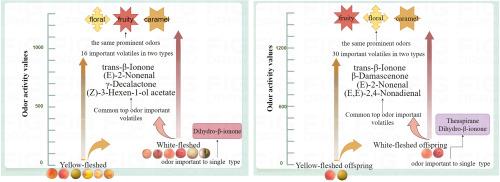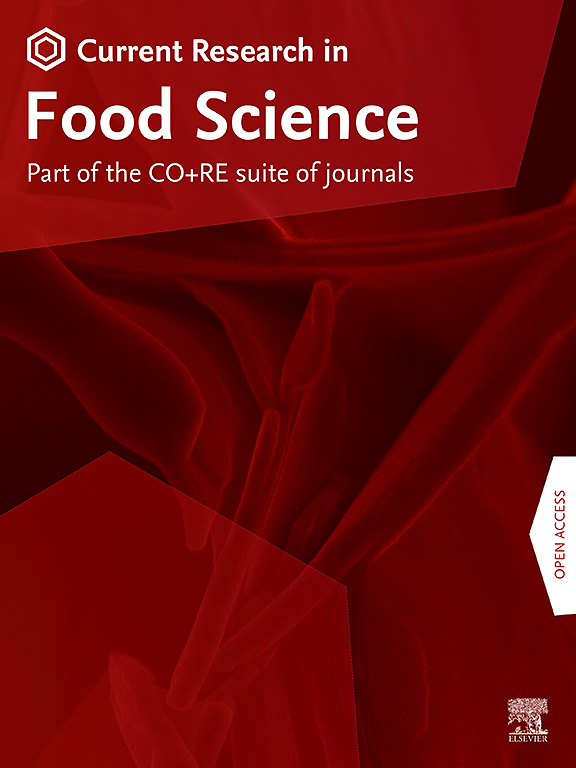阐明挥发性化合物对桃(Prunus persica L.)栽培品种和后代果肉颜色的影响
IF 7
2区 农林科学
Q1 FOOD SCIENCE & TECHNOLOGY
引用次数: 0
摘要
黄肉桃和白肉桃因果肉颜色多样而备受青睐。类胡萝卜素的积累主要决定了果肉颜色的差异,而挥发性化合物对其香气的影响在很大程度上仍未得到研究。在此,我们采用了多种分析方法,包括气味重要性评估、层次聚类和香气特征分析,来研究这两种桃子以及亲本相同的后代的挥发性成分和香气特征。二氢-β-酮是两种桃子之间唯一表现出含量和气味重要性差异的挥发物,在后代栽培品种中,此类挥发物还包括阿司匹林。在两种水蜜桃及其后代栽培品种中分别鉴定出了 16 种和 30 种重要的挥发性物质,并随后从图表的角度对其香气特征进行了概述。两种水蜜桃类型和后代栽培品种都显示出普遍的花香、果香和焦糖香,而白肉栽培品种的气味活性值较高,特别是木质气味,以及主要气味方向的平衡度不同,决定了它们的香气各不相同。通过深入研究两种桃子在气味方向和香气特征方面的关键差异,本研究阐明了源于果肉颜色差异的香气区别,并为揭示不同果肉颜色水果的香气形成机制铺平了道路。本文章由计算机程序翻译,如有差异,请以英文原文为准。

Elucidating the influence of volatile compounds on aroma profiles across peach (Prunus persica L.) cultivars and offspring exhibiting diverse flesh colors
Yellow- and white-fleshed peach fruits are favored for their diverse flesh colors. While carotenoid accumulation primarily dictates flesh color differences, the influence of volatile compounds on their aromas remains largely unexplored. Here, multiple analytical methods including odor importance assessment, hierarchical clustering, and aroma characterization analysis were employed to investigate volatile compositions and aroma characteristics of the two types of peach, as well as the offspring with identical parentage. Dihydro-β-ionone was the sole volatile exhibiting content and odor importance disparities between the two types of peach, and in descendant cultivars such volatiles encompassed theaspirane additionally. Respectively 16 and 30 important volatiles were identified in the two peach types and in the offspring cultivars, and subsequently overview of their aroma characteristics was obtained from a graphical perspective. The two peach types and offspring cultivars all revealed prevalent floral, fruity and caramel notes, whereas the higher odor activity values and especially the woody odors in the white-fleshed cultivars, as well as the differential balance degrees of the main odor directions defined the distinct aromas. By delving into the pivotal differences in odor directions and aroma profiles between the two types of peach, this research elucidates the aroma distinctions rooted in flesh color variations and paves the way for uncovering aroma formation mechanisms in fruits with varied flesh colors.
求助全文
通过发布文献求助,成功后即可免费获取论文全文。
去求助
来源期刊

Current Research in Food Science
Agricultural and Biological Sciences-Food Science
CiteScore
7.40
自引率
3.20%
发文量
232
审稿时长
84 days
期刊介绍:
Current Research in Food Science is an international peer-reviewed journal dedicated to advancing the breadth of knowledge in the field of food science. It serves as a platform for publishing original research articles and short communications that encompass a wide array of topics, including food chemistry, physics, microbiology, nutrition, nutraceuticals, process and package engineering, materials science, food sustainability, and food security. By covering these diverse areas, the journal aims to provide a comprehensive source of the latest scientific findings and technological advancements that are shaping the future of the food industry. The journal's scope is designed to address the multidisciplinary nature of food science, reflecting its commitment to promoting innovation and ensuring the safety and quality of the food supply.
 求助内容:
求助内容: 应助结果提醒方式:
应助结果提醒方式:


